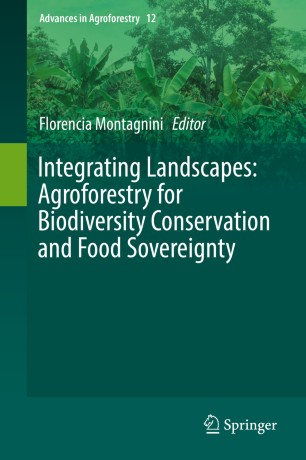Ver ítem
- xmlui.general.dspace_homeCentros Regionales y EEAsCentro Regional CórdobaEEA ManfrediPartes de librosxmlui.ArtifactBrowser.ItemViewer.trail
Resilience Management at the Landscape Level: An Approach to Tackling Social Ecological Vulnerability of Agroforestry Systems.
Resumen
It has been estimated that more than half of the earth’s natural ecosystems have been modified by anthropogenic activities for the provision of ecosystem goods (Millennium Ecosystem Assessment 2005). Both human well-being and natural ecosystems are directly affected by social activities and/or conditions, as well as by stochastic climatic events (Butler and Oluoch-Kosura 2006; Fremier et al. 2013). Agroforestry landscapes can provide a great variety of
[ver mas...]
It has been estimated that more than half of the earth’s natural ecosystems have been modified by anthropogenic activities for the provision of ecosystem goods (Millennium Ecosystem Assessment 2005). Both human well-being and natural ecosystems are directly affected by social activities and/or conditions, as well as by stochastic climatic events (Butler and Oluoch-Kosura 2006; Fremier et al. 2013). Agroforestry landscapes can provide a great variety of ecosystem goods and services at both farm and global levels (Jose 2009; Thompson et al. 2011). These landscapes are also home to thousands of rural people whose livelihoods depend on the forest. This dependence on the forest for subsistence strengthens the need to promote the sustainable management of native forests (Millennium Ecosystem Assessment 2005; Jose 2009) Sustainability is a holistic and trans-disciplinary concept, therefore a framework
that integrates both social and ecological sciences is needed to understand and promote it. Despite the increase in theoretical discussions concerning coupled social and ecological systems (hereafter ‘SES’) over the last decades, SES have not yet
been implemented as management and governance tools, possibly due to their complexity. There is a wide consensus that the analysis of alternative management strategies should focus on emergent properties of these complex systems (Folke 2006).
In the face of increasing anthropogenic pressure to obtain ecosystem goods from agroforestry landscapes, management decisions taken at the local level can severely affect the resilience of SES at the landscape level, thus it is essential to adopt a broader analytical perspective, considering the potential impacts of management practices on other SES within the landscape. In this chapter we focus on management practices of social-ecological systems at the landscape scale by using a resilience approach to reduce the vulnerability of agroforestry systems (AFS) to environmental and/or anthropogenic disturbances. We define social-ecological systems and introduce key emergent SES properties for agroforestry management. We then propose a framework to analyze socialecological systems at a landscape scale. Finally, we demonstrate this framework with an example that shows the benefits of resolving social-ecological conflicts at the landscape scale.
[Cerrar]

Fuente
Integrating Landscapes: Agroforestry for Biodiversity Conservation and Food Sovereignty (F. Montagnini Ed.), Advances in Agroforestry. Springer International Publishing. Chapter 5, p. 127-148.
Fecha
2017
Editorial
Springer
ISBN
978-3-319-69370-5 (print)
978-3-319-69371-2 (on line)
978-3-319-69371-2 (on line)
Formato
pdf
Tipo de documento
parte de libro
Palabras Claves
Derechos de acceso
Restringido
 Excepto donde se diga explicitamente, este item se publica bajo la siguiente descripción: Creative Commons Attribution-NonCommercial-ShareAlike 2.5 Unported (CC BY-NC-SA 2.5)
Excepto donde se diga explicitamente, este item se publica bajo la siguiente descripción: Creative Commons Attribution-NonCommercial-ShareAlike 2.5 Unported (CC BY-NC-SA 2.5)

